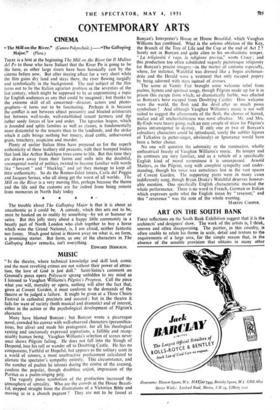MUSIC
" IN the theatre, where technical knowledge and skill look comic and the most revolting crimes are not without their power of attrac- tion, the love of God is just dull." Saint-SaEns's comment on Gounod's pious opera Polyeucte sprang unbidden to my mind as I listened to Vaughan Williams's Pilgrim's Progress. Call the piece what you will, morality or opera, nothing will alter the fact that, given at Covent Garden, it must conform to the demands of the theatre or be judged a failure. It might be given at a Three Choirs Festival in cathedral precincts and succeed ; but in the theatre it fails for want of variety (both musical and dramatic) and of interest, either in the action or the psychological development of Pilgrim's character.
Many have blamed Bunyan ; but Bunyan wrote a picaresque novel, crowded his canvas with well-observed characters (personifica- tions, but alive) and made his protagonist, for all his theological ranting and unctuously expressed aspirations, a fallible and recog- nisably human being. Vaughan Williams's selection of scenes never once shows Pilgrim failing. He does not fall into the Slough of Despond, lose his roll or wander off to Doubting Castle. He has no companions, Faithful or Hopeful, but appears as the solitary saint in a world of sinners, a most unattractive predicament calculated to alienate the spectator's sympathy entirely. This circumstance, and the number of psalms he intones during the course of the evening, confirm the popular, though doubtless unjust, impression of the Puritan as a psalm-singing prig. The vaguely pious symbolism of the production increased the atmosphere of unreality. Who arc the crowds at the House Beauti- ful, stepped straight from the illustrations of a Victorian Bible and moving as in a church pageant ? They are not to be found at Bunyan's Interpreter's House or House Beautiful, which Vaughan Williams has combined. What is the solemn oblation of the Key, the Branch of the Tree of Life and the Cup at the end of Act 2'l Surely not in Bunyan and quite alien to his un-ritualistic temper. " La religiosity e vaga, la religions precisa," wrote Croce ; and this production too often substituted vaguely picturesque religiosity for Bunyan's precise imagery—in the matter of costume especially, where, for instance, Watchful was dressed like a bogus archiman- drite and the Herald wore a vestment that only escaped popery by being adorned with stars instead of crosses.
The scene at Vanity Fair brought some welcome relief from psalms, hymns and spiritual songs, though Pilgrim made up for it in prison (his escape from which, so dramatically feeble, was effected as Bunyan's hero escaped from Doubting Castle). How welcome were the world, the flesh and the devil after so much pious symbolism ! And although Vaughan Williams's music is not well suited to suggest the allurements of the flesh, the chorus of hatred, malice and all uncharitableness was most effective. Mr. and Mrs. By-Ends were heavy going, such an easy couple of straw for Pilgrim's pious intransigence to destroy. If only one or two of Bunyan's subsidiary characters could be introduced, surely the subtler figures of Talkative (a patter-singer, obviously) or Ignorance would have been a better choice.
No one will question the solemnity or the ruminative, wholly untheatrical beauty of Vaughan Williams's music. Its temper and its contours are very familiar, and as a vehicle of a specifically English kind of moral earnestness it is unsurpassed. Arnold Matters, as the Pilgrim, sang with complete sympathy and under- standing, though his voice was sometimes lost in the vast spaces of Covent Garden. The supporting parts were in many cases indifferently sung, though Bryan Drake's Watchful deserves honour- able mention. One specifically English characteristic marked the whole performance. There is no word in French, German or Italian which expresses quite what the English mean by " reverent," and this " reverence ' was the note of the whole evening. MARTIN COOPER.


































 Previous page
Previous page